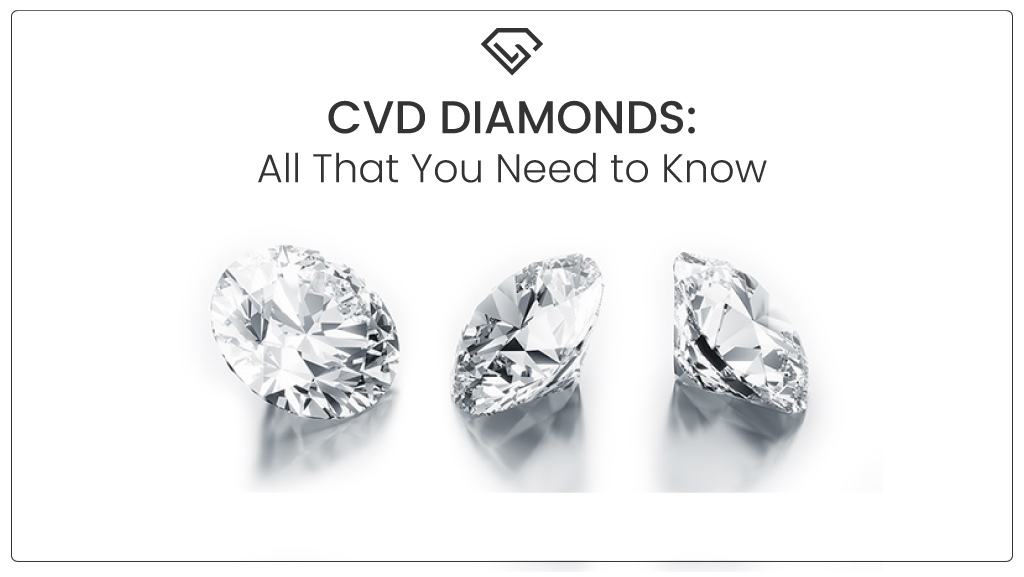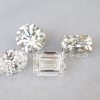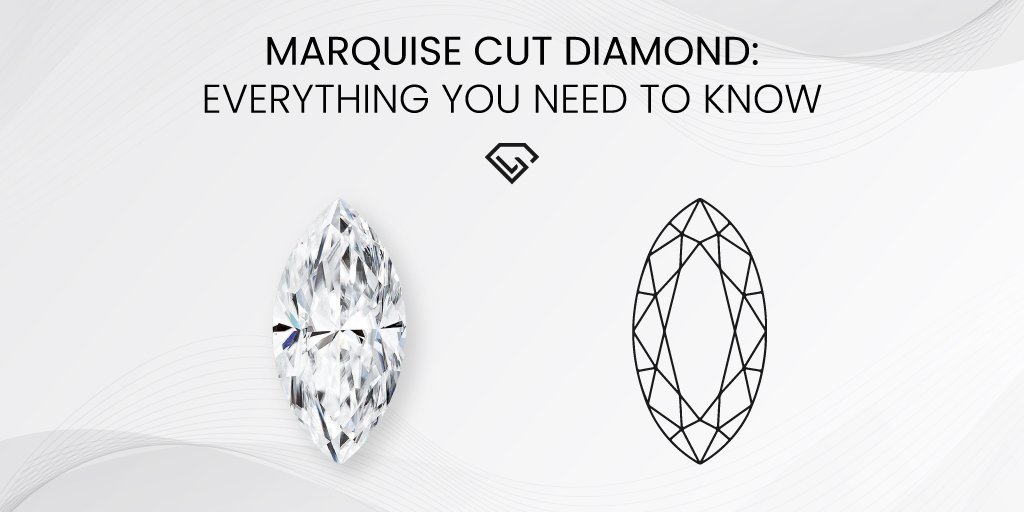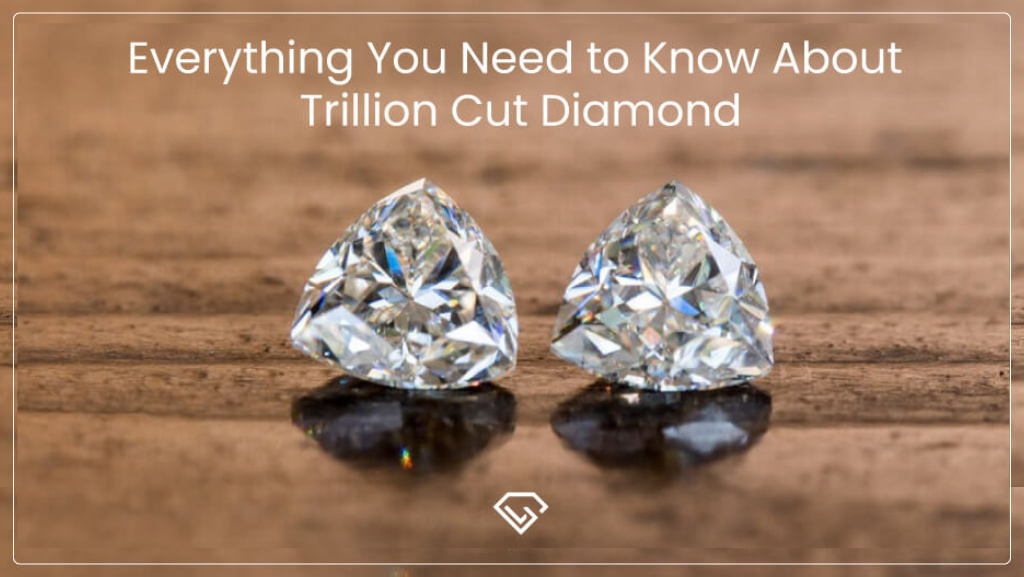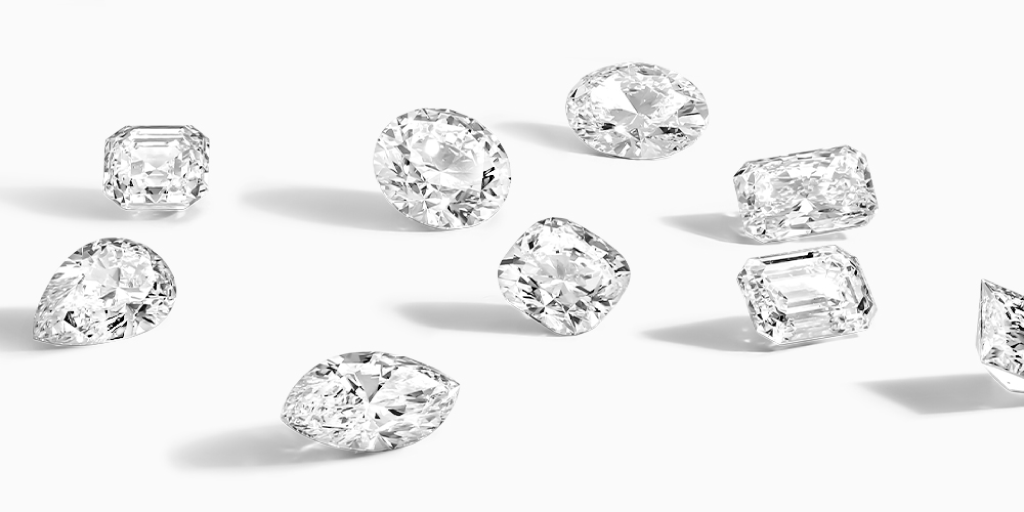Heart Shaped Diamond: Everything You Need to Know
One of the rarest and symbolic cuts in diamond with its never-ending evergreen symbol of love and affection the heart shaped diamond is eccentric and an attractive substitute to the other common, repetitive day to day diamond cuts.
Where round-shaped diamonds cover around two-thirds of the market, the heart shaped diamonds on the contrary cover a minute fraction as compared to the former ones making them distinctive and even more special.
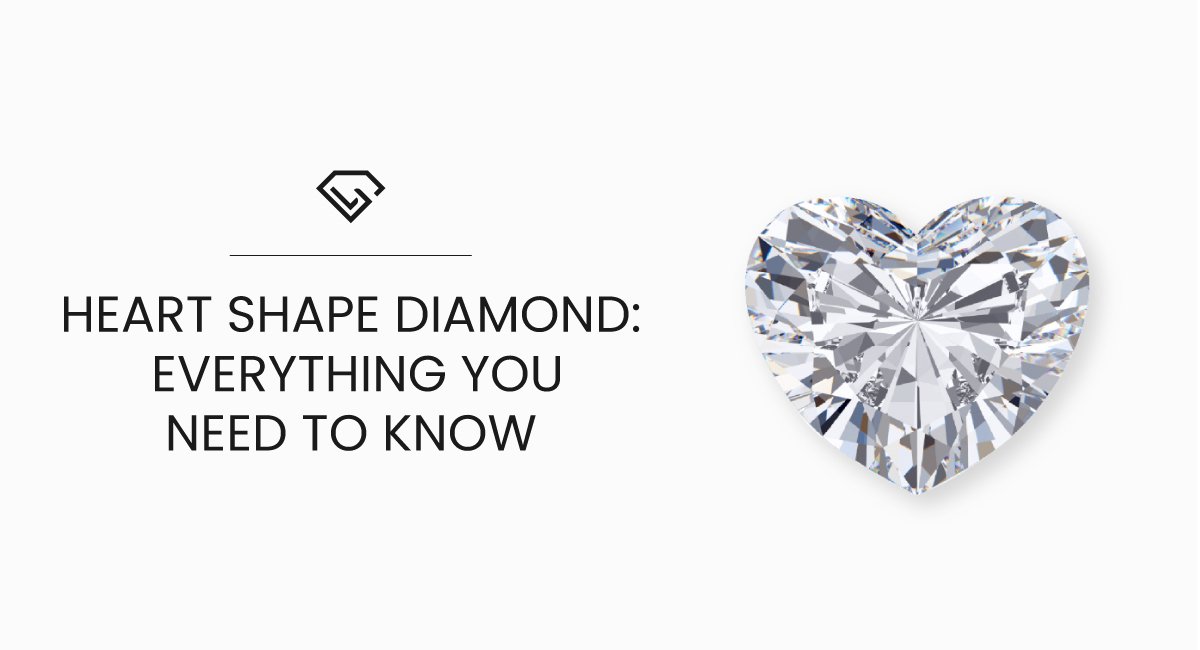
Historically the heart-shaped diamond has always been related to beauty and class with its creation in the late 1500s when Mary Queen of the Scots sent Queen Elizabeth the heart shaped diamond ring by which the queen was really impressed and happy thus marking the stone of their friendship and taking their alliance to new heights.
Making it one of the most unique and elegant symbols of friendship and goodwill between the royals.
Even after being a more accessible cut over time it still remains quite expensive and coherent diamond cuts to create. Only a skillful and talented craftsman along with the best tools can create this cut thus making it rare and exotic.
What is Heart Shaped Diamond?
From bracelets to pendants to rings the heart shaped diamonds are used in various jewelry pieces, commonly used in diamond engagement ring in the center thus enhancing it even more.
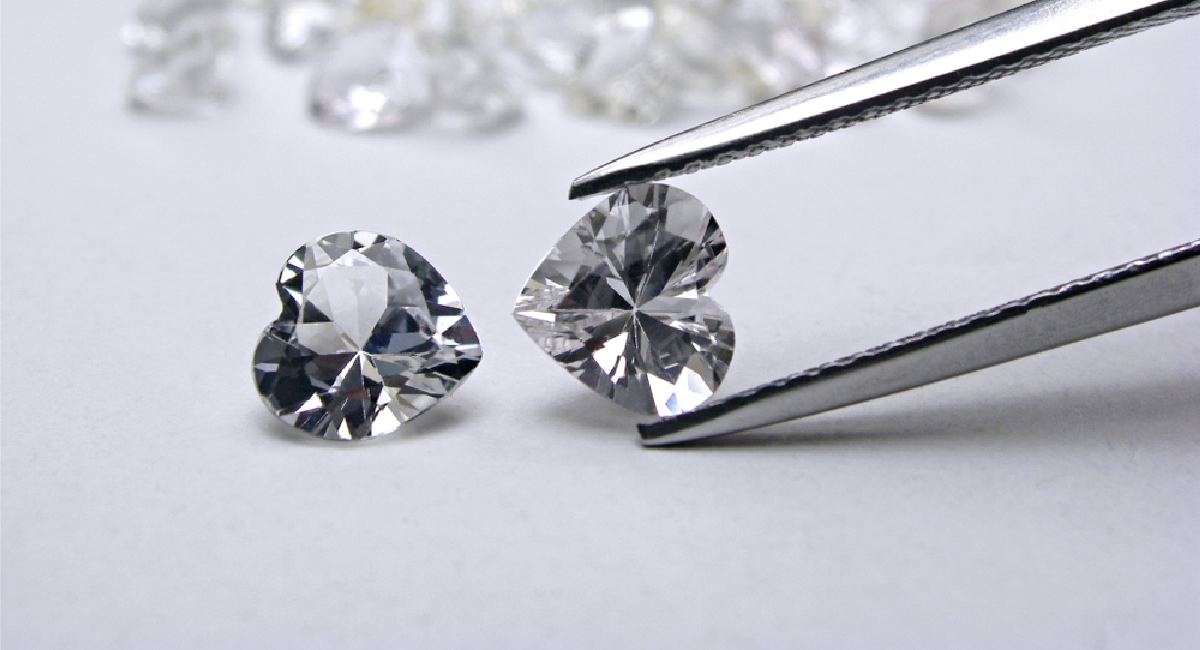
Even celebrities have been spotted time and again with heart shaped diamond rings the most recent ones being Lady Gaga and Nicki Minaj.
Even though it is quite distinct in terms of look and design, this cut is based on the round brilliant cut. Varying in length and width, usually, the heart shaped diamond has about 56 to 58 facets.
The diamond cut has been in existence for quite a long time but these days it’s the most popular choice of the less traditional brides who relate it with love and uniqueness thus making it a symbolic representation of love on their special day.
While buying the heart shaped diamond one should take into account the symmetry as it is important that the halves are identical for perfection.
Even the size needs to be taken into account as it also impacts brilliance, the smaller the size is less visible the cut becomes. Also one should consider the setting to maintain shape.
Shape
Carat
Cut
Color
Clarity
Price
heart
3.00
Ideal
D
VVS2
$1175 $1119
View
heart
3.07
Ideal
D
IF
$17316 $16491
View
heart
2.23
Ideal
F
VS1
$686 $653
View
heart
1.82
Ideal
D
IF
$5737 $4098
View
heart
1.83
Ideal
D
VVS2
$1558 $1113
View
heart
1.90
Ideal
D
VVS2
$1614 $1153
View
heart
1.82
Ideal
D
VVS1
$1931 $1379
View
heart
1.85
Ideal
D
VVS1
$2087 $1491
View
heart
1.86
Ideal
D
IF
$5862 $4187
View
heart
1.80
Ideal
D
IF
$5676 $4054
View
heart
1.82
Ideal
D
IF
$5404 $3860
View
heart
3.05
Ideal
D
VVS2
$4234 $3024
View
heart
2.30
Ideal
E
IF
$7570 $5407
View
heart
2.01
Ideal
D
VS1
$1928 $1377
View
heart
2.07
Ideal
D
VVS1
$2621 $1872
View
heart
2.27
Ideal
D
IF
$8784 $6274
View
heart
2.33
Ideal
D
IF
$9652 $6894
View
heart
2.66
Ideal
E
VVS1
$3459 $2471
View
heart
2.98
Ideal
D
VVS1
$4966 $3547
View
heart
3.10
Ideal
F
IF
$8298 $5927
View
4C’s of Heart Shaped Diamond
Heart Shaped Diamond Cut
While comparing different diamonds one needs to take into account the cut quality due to the distinctive appearance of the heart shaped diamond thus making it one of the important aspects to look for.
But easier said than done, judging the cut quality of the heart shaped diamond is no cakewalk as compared to reading the GIA certificate. The GIA certificate of the heart shaped diamond does not always go into the slightest of the details of the cut quality, unlike the other common diamond shapes.
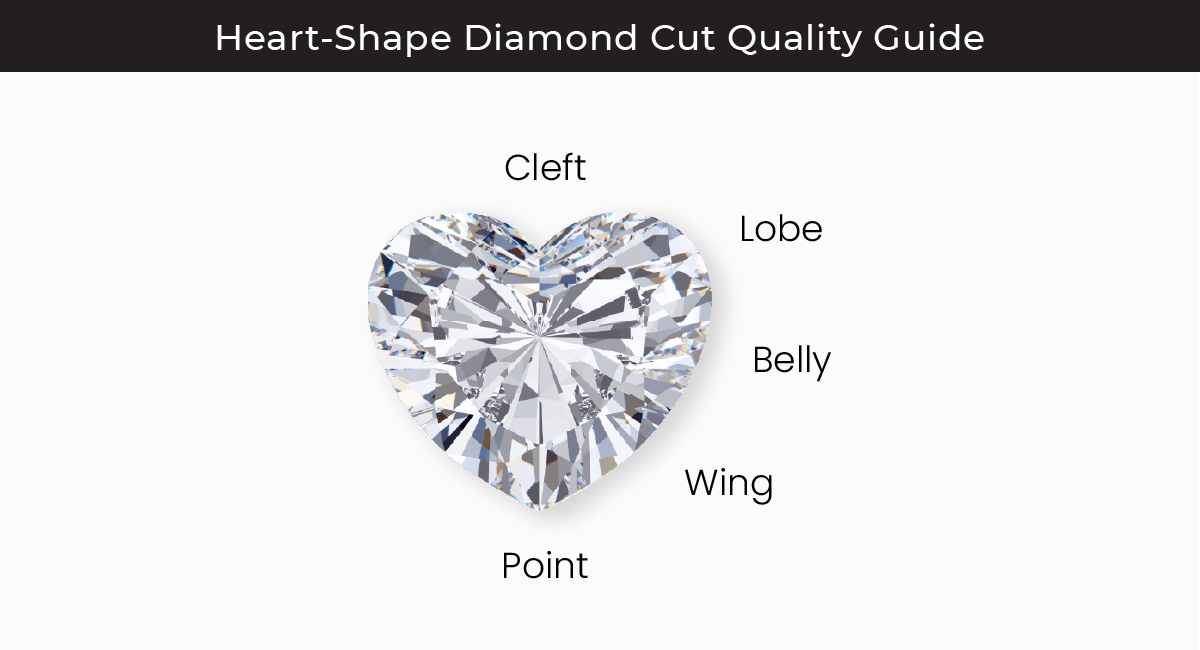 To ensure that we are buying a well-cut diamond with an enchanting appearance one needs to take a look at the cut grade thus making it quite important to take this into consideration before making a purchase.
To ensure that we are buying a well-cut diamond with an enchanting appearance one needs to take a look at the cut grade thus making it quite important to take this into consideration before making a purchase.
Heart Shape Diamond Length to Width Ratio
The ideal L/W ratio for the heart shaped diamond is 1 which means that the diamond should be exactly as long as it is wide. The heart shaped diamonds which are having an ideal or nearly ideal L/W ratio look compatible and reasonable and also do not appear bulbous and ugly.
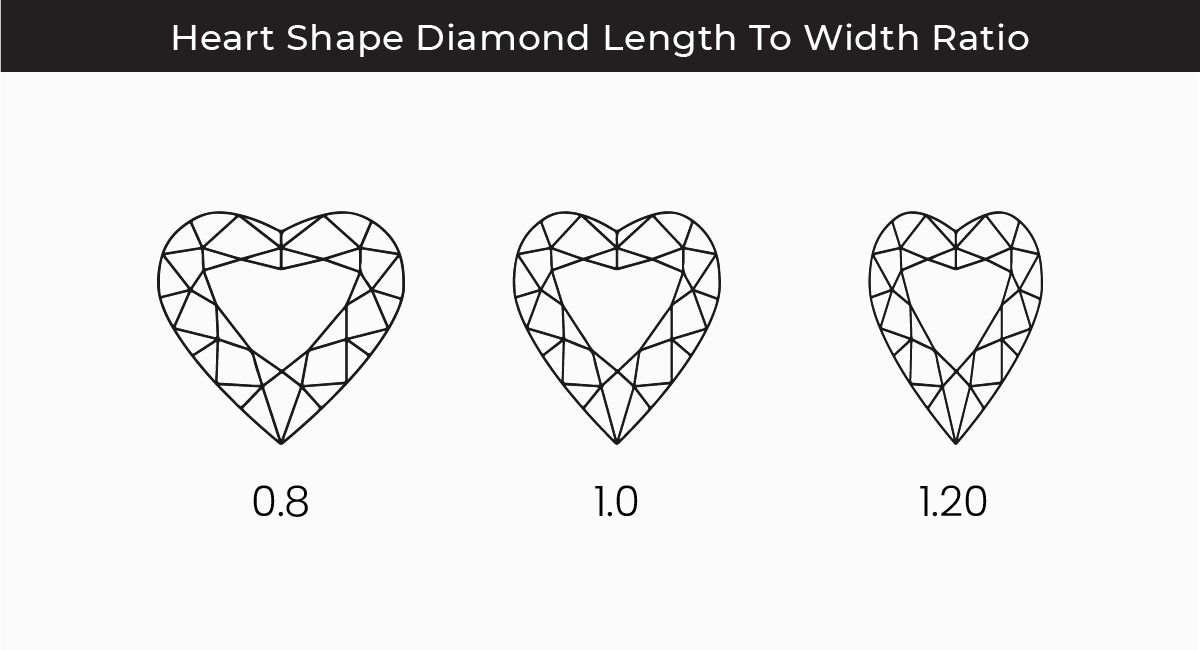 The ones with a ratio less than that of 0.9 will look quite wide and so should be avoided for the best. Even if the ratio is above 1.1 they start looking lean and overly stretched. So for the best results, one should go for the ratio to be as close to 1 as possible as in all the diamonds near to this range look ecstatic and until and unless we specifically desire thin or wide diamonds.
The ones with a ratio less than that of 0.9 will look quite wide and so should be avoided for the best. Even if the ratio is above 1.1 they start looking lean and overly stretched. So for the best results, one should go for the ratio to be as close to 1 as possible as in all the diamonds near to this range look ecstatic and until and unless we specifically desire thin or wide diamonds.
Depth and Table
The diamonds shine and sparkle based on the amount of light that enters and is reflected off its other facets and so size plays an important role in this.
The heart shaped diamonds are nearly flat at the top facet which is known as a table. And ideally, it should make up to 50 to 60 percent of the overall width. The measurement from the bottom to the top of the diamond gives us an idea of the depth of the diamond which is expressed as the width percentage of the same.
For the best sparkle and shine in the heart shaped diamonds this percentage should lie between 56 to 66 percent of the range.
Symmetry
One of the most important factors of the heart shaped diamond is its symmetry due to its bit complicated shape.
The point from the top of the diamond shapes which faces inwards is referred to as the cleft, the sharp point at its bottom, the lobes(the round parts of the diamond which are responsible for creating the heart shape), and also the belly and the wing included are also some of the fancy features that make the shape of the heart shaped diamond of this cut.
The left picture has a distinct cleft that makes its heart shape easy to see also when we look at the diamond from an angle. Even though there is no necessity for the point to be sharp for a clear beautiful heart shape it should divide the bottom section of the diamond into two clear, equal, and separate halves.
on comparing, on the right side of the image, there is a less distinct point and as a result, it is less heart like in appearance and looks more round.
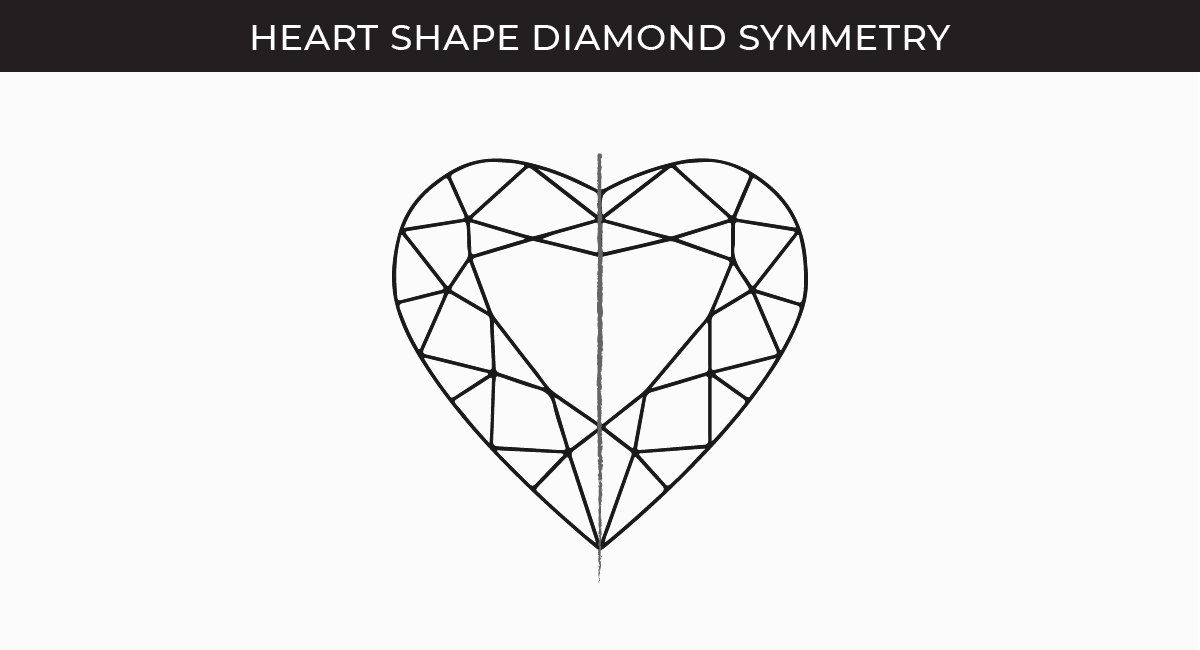
Beyond the cleft and also the point it is quite important to check whether the diamond is symmetrical or not. one should always take a look at the lobes of the diamond in case of any imperfections. These are the upper rounded areas that create the top of the heart shape. We should always take into account the symmetry and the lobes to rule out imperfections, the upper top areas which create the top of heart shape.
Both different sides of the diamond should most probably look similar with not much visible difference in facets or in the lobe size. The right picture on the other hand despite its better color and the clarity of grades is visibly less symmetrical.
Wings and Belly
The shape of the sides of the heart shaped diamond is called the wings and belly. Usually, the wings of the heart shaped diamond should be a little bit rounded but not overly bulbous as a result creating the ideal heart shape and will look spectacular as a center stone or as a part of a pendant or other piece of jewelry. The heart shape will not be highlighted much if the appearance is quite round.
Heart Shaped Diamond Clarity
When seen by a gemologist the scale at which the diamond appears to be clean should always be good. The diamonds in which the clarity grades are high have very few scars and imperfections as compared to the ones with lower clarity grades where the blemishes are quite obviously visible.
The scale of GIA grades Clarity:
- Flawless (FL)
- Internally Flawless (IF)
- Very Very Small Inclusions (VVS1)
- Very Very Small Inclusions (VVS2)
- Very Small Inclusions 1 (VS1)
- Very Small Inclusions 2 (VS2)
- Small Inclusions 1 (SI1)
- Small Inclusions 2 (SI2)
- Inclusions 1 (I1)
- Inclusions 2 (I2)
- Inclusions 3 (I3)
The grades which are of quite a high scale for instance IF and VVS1 are very rare to achieve and it is very unlikely to find a diamond of IF grade obviously, the cost and premium to purchase a stone with this clarity grade is very huge.
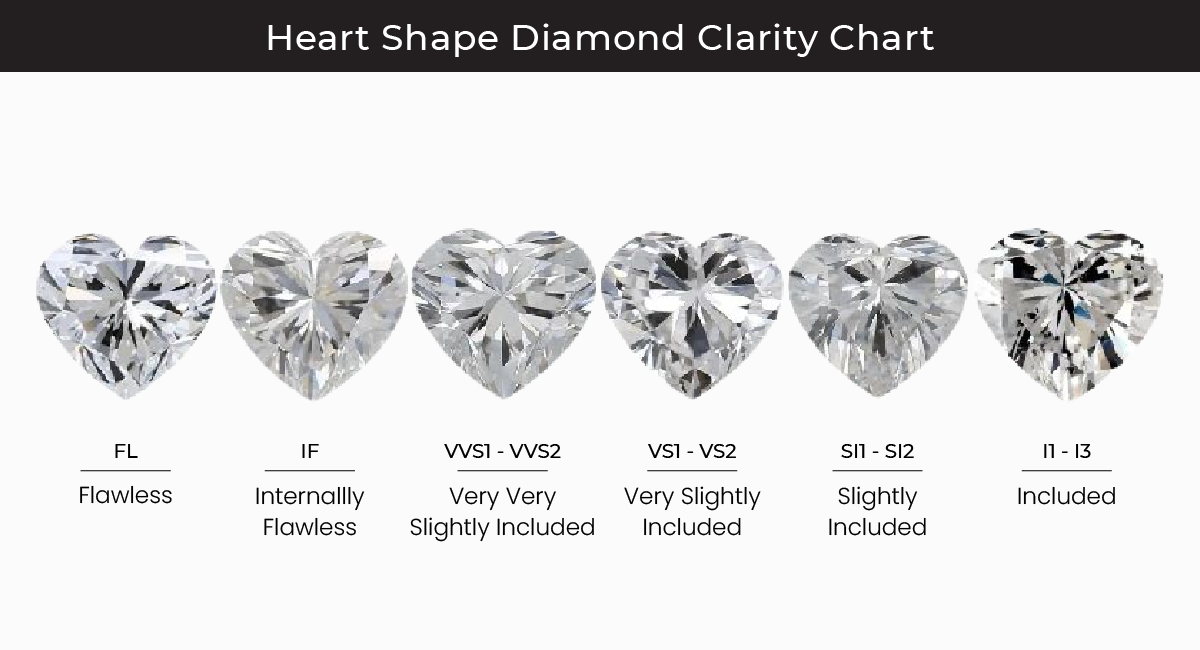
While grading for clarity the gemologist will precisely look into account by using the loupe of jeweler having 10x magnification as in with this level of magnification it is quite easy to find the imperfections which are also entirely visible to the naked eye once we set the diamond in a ring.
In the case of the diamonds with heart shape the clarity grade of S1 or good shall be provided which is eye clean. As the heart shape is modified into a brilliant cut the small inclusions found in S1 and VS2 diamonds are not that visible to naked eyes.
Heart Shape Diamonds Color
The grades of the diamond color which are used by the GIA fall in the range from D to Z where the D grade denotes that our diamond is crystal clear and colorless.
As at Z, it is obvious that the diamond is tinted with visible yellow color clearly. The color of the heart shaped diamond is quite hard to distinguish as it reflects quite a huge amount of light. The heart shaped diamonds are a modification of the common round brilliant-cut thus making it rare and unique.
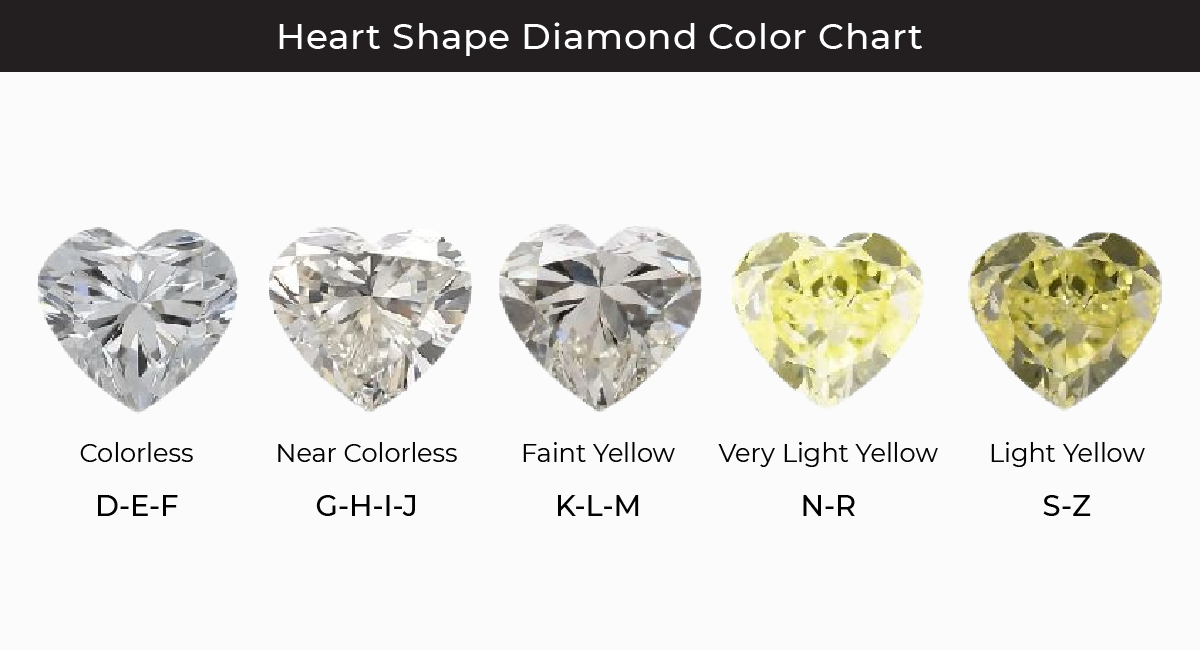
The color grade H or better is mostly recommended if one chooses white gold or platinum setting and the saved money can be used to choose a diamond that has a higher carat weight.
A grade in lower color is recommended in a yellow or rose gold setting and a J color grade is mostly for the settings which are solitaire.
Heart Shaped Diamond Carat weight
To put it in simple words diamond carat weight measures how much the diamond weighs. Like all other lab-created diamonds, the heart shaped diamonds are also available in a huge variety of carat weights. It is usually recommended one should choose the largest carat weight that fits in one’s budget.
The amount saved on color and clarity can be used to get a noticeably larger diamond size than one has initially expected to buy.
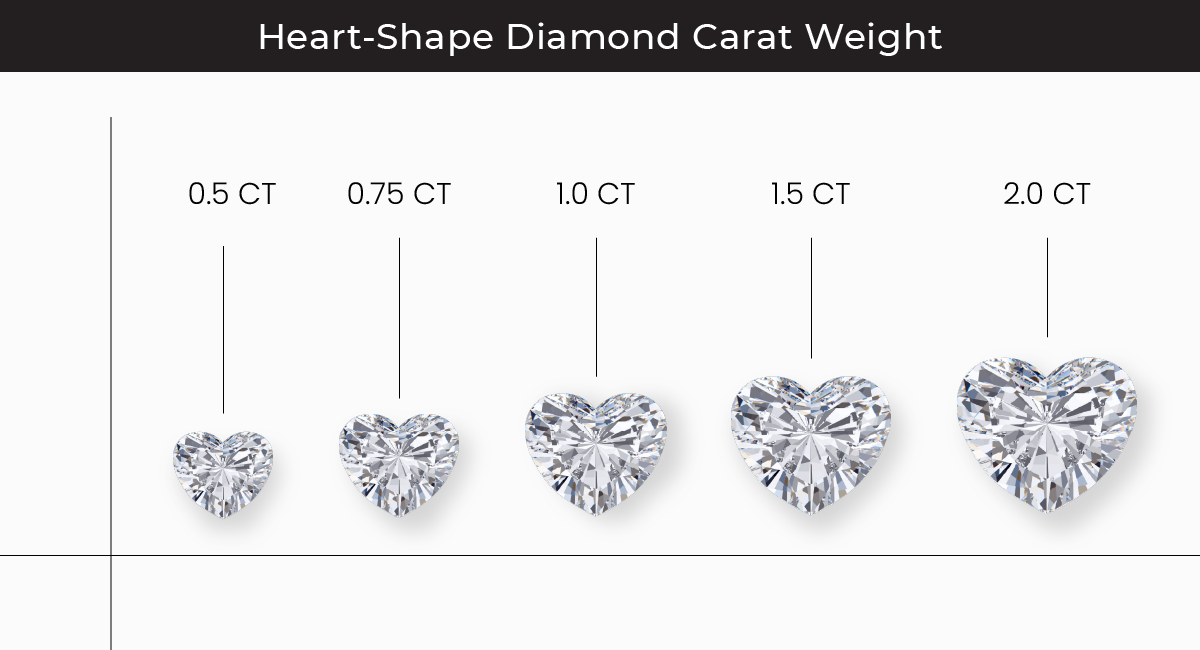
Due to the unique shape and cut of the diamond, the ones with the larger carat weights become visually more appealing and enchanting as in higher the carat weight of the diamond more highlighted and beautiful the heart shape becomes. The usual recommendation for the heart shaped diamond is that of the 1+ carat range as in the heart shape of the diamond smaller in size becomes less visible and appealing once it’s set in the ring.
Do Heart Cut Diamonds Have a Bowtie?
Well, this generally comes about when the light shimmers through and enters the diamond through a table, and the large parallel surface on the top of the stone, but it doesn’t reflect the viewer. It isn’t just with diamonds that have fancy cuts, but to an extent, all heart cut diamonds show the bowtie effect, there is also shadowing around the sides.
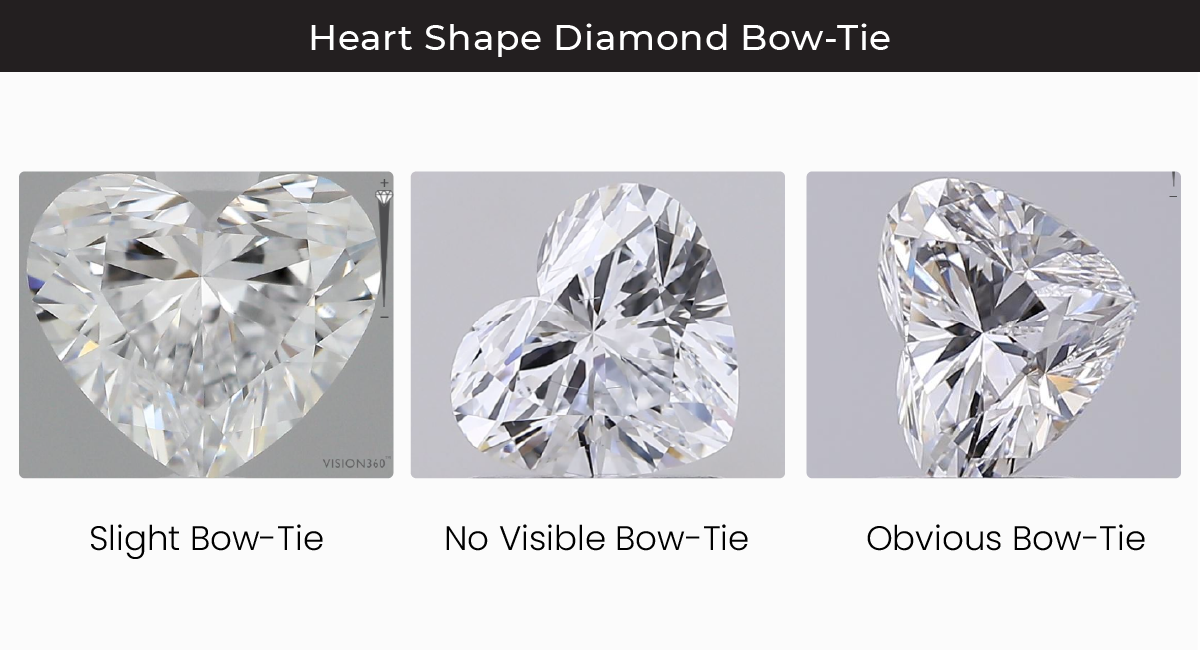
There are reasons why diamond cutters try to avoid the bowtie effect and one of them is, they want the heart shaped diamonds to reflect as much light. Rightly so, there is a reason people invest in heart cut diamonds, and the reflection of light usually catches the eye and is liked by many.
Factors to Consider Before Investing in Heart Shaped Diamond
The best size of the Heart diamonds is when they are around .50 carats or above because when that big piece of solitaire outshines other rings is when it looks best. Also, anything below the size mentioned makes your heart shaped diamond hard to identify. So, invest wisely because your expression of love should be seen from a distance.
If you don’t know this then let us tell you maintaining regularity or symmetry is a very prime consideration you need to look out for. The heart, the two halves of it, must be of equal sizes as an uneven style will take away from your ring majorly.
Also, remember to consider the division between both the heart-halves should be prominent and done with utmost precision to attain even halves. Symmetry is a vital component to examine when choosing a heart diamond. It’s essential that the two halves of the heart shape diamond are indistinguishable and the heart’s portion is distinct and even.
Make sure to consider a place where precision is given utmost importance when you invest in the heart shaped diamond ring of yours because the cut in your prized possession should be chiseled to perfection with utmost detail and accuracy.
There’s a reason why heart shaped diamond rings are such a famous gift for lovers. It is the precision put into creating them, and without that, a heart shaped diamond may not attain its glorious look.
When choosing a heart shaped diamond ring make sure you pay a lot of attention to what is the overall shape of the ring. Making sure that it isn’t uneven is vital because if so then it takes the unique look away from the ring, and that is not something you’d like to waste your money on.
Lastly before making that important decision of investing in this once-in-a-lifetime gift make sure you check the ratio at which the heart shaped lab diamond. Ideally, you should strike a 0.90 to 1.10 balance of the heart stone as that would be the perfect size making it look evenly big and equally wide.
Best Heart Shape Diamond Engagement Ring Settings
Heart Shaped Diamond Solitaire Ring
If you love the old school, the classic solitaire positioning, which has a four-prong setting, the prong setting is nothing but the use of metal projections, called prongs, to secure a gemstone. The prong setting lets the light strike a stone from more angles, which increases its elegance.
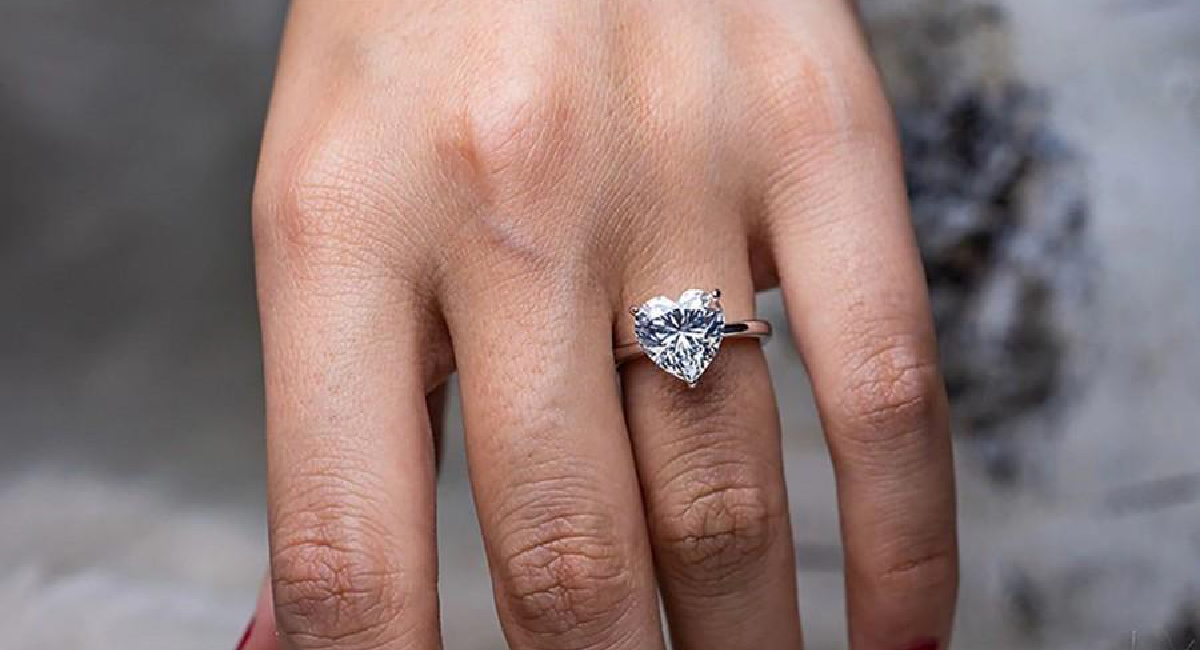
It helps enhance the brilliance of your heart cut diamond to a greater extent. Though a six-prong setting protects your ring better, however, the downfall is that it lets far less light in. But again on the brighter side, this setting manages to conceal inclusions on the edges of the stone, too.
Heart Shape Diamond Multi-Stone Setting
If you have your heart cut diamond less than one carat, though we don’t suggest that, but if you do a fine halo setting that will surround your heart cut diamond with smaller ones would do just fine.
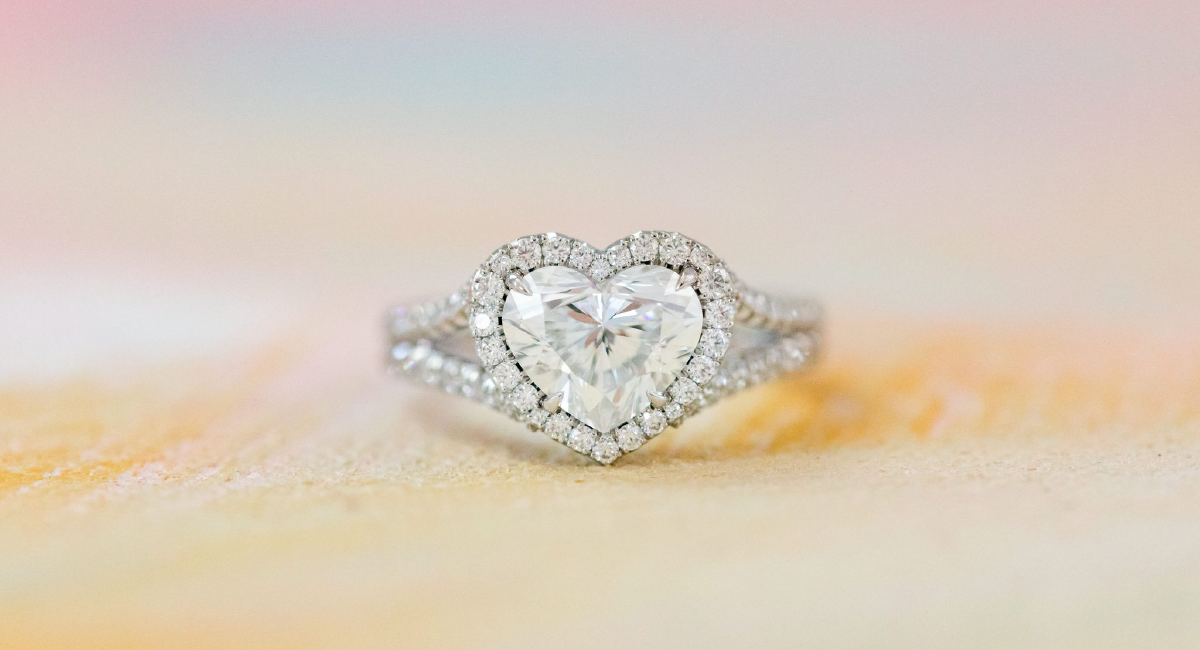
Not only will it make it shine from a distance, but also another touch of elegance to your classic beauty.
Heart Shape Diamond Three Stone Setting
Another trick that you can use to make your heart shape diamond ring stand out is adding a three-stone setting, which makes the heart stone look bigger. They can be colored and placed alongside it, which only enhances the show of the diamond in the center because of the contrast.
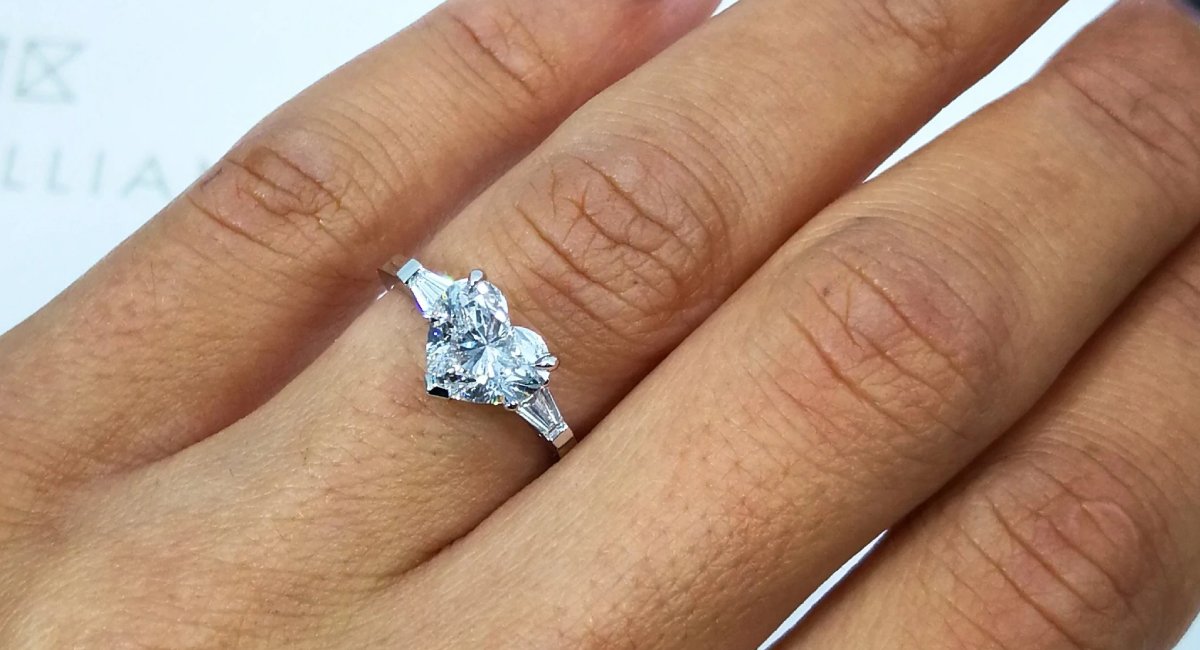
We all know that the heart shaped diamond is something you may hold very dear to you, hence it should be your duty to ensure the pointy end of the stone is well-guarded, for whichever setting you choose.
Conclusion
Unique and classy in its own way the heart shaped diamond is the best way to show one’s love and care and also to take into account that the large percentage of the rough diamond is used in making the heart shape thus making it quite feasible and pocket friendly.
Over the years the choice for this diamond cut is increasing widely as people relate it to the symbol of love.
The main factors which we need to have a look at in this one are the cut, nearly ideal L/W ratio, excellent depth and table, best symmetry, and the perfect overall shape one should also ask for the 360° photos of the diamonds for optimal results.
FAQs
What is the best ratio for a heart diamond?
The ideal ratio is around 1:1, creating a well-proportioned heart shape. However, personal preference plays a role in choosing the perfect ratio.
Can heart shaped diamonds have inclusions?
Like other diamond shapes, heart diamonds may have inclusions. A higher clarity grade ensures fewer imperfections, enhancing the diamond’s brilliance.
How much is a 1 carat heart shaped diamond worth?
The value of a 1-carat heart shaped diamond can vary significantly based on factors like cut, color, clarity, and overall quality. On average, you can expect prices ranging from $400 to $6,000 or more.
Do heart shape diamonds come in various sizes?
Yes, heart shaped diamonds are available in a range of sizes to suit different preferences and budgets, from delicate to more substantial carat weights. You can use heart shape diamond size chart on LGD.
Do heart shape diamonds come in various sizes?
Yes, heart shape lab grown diamonds are available in a range of sizes to suit different preferences and budgets, from delicate to more substantial carat weights.

